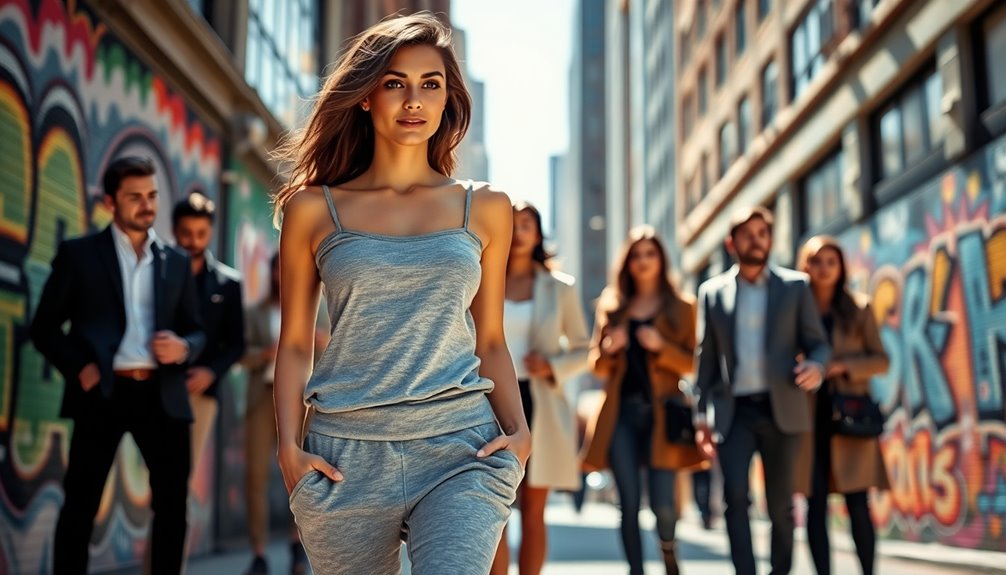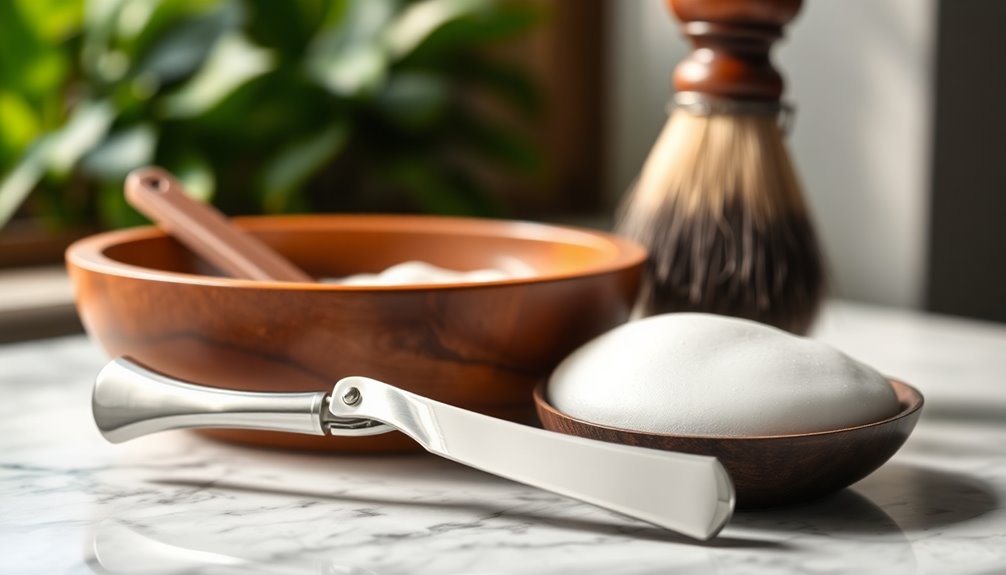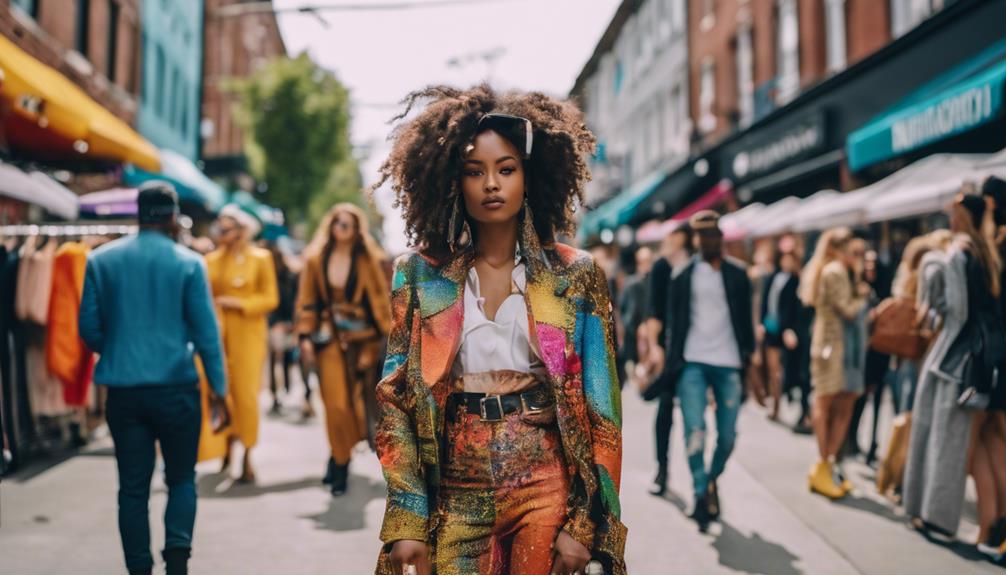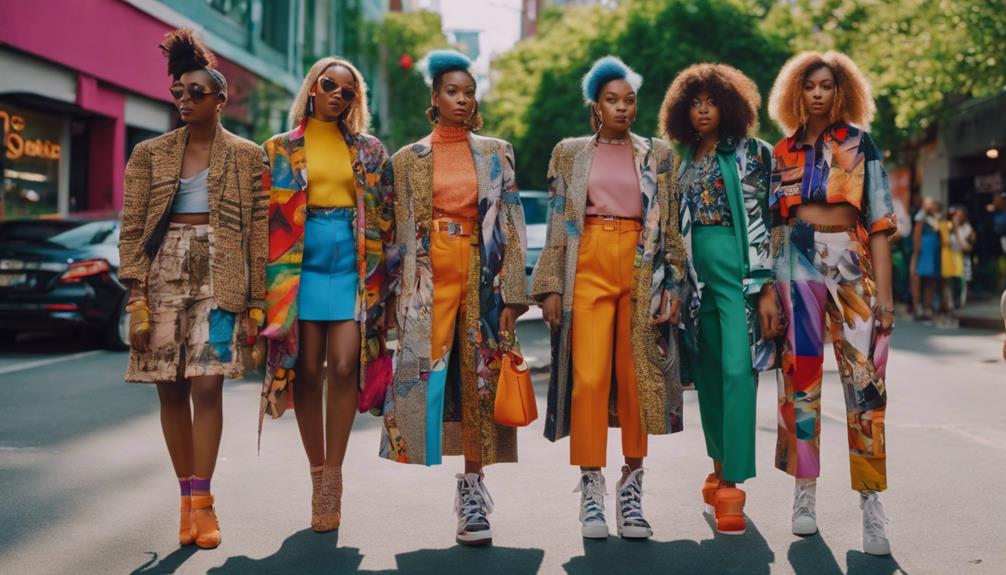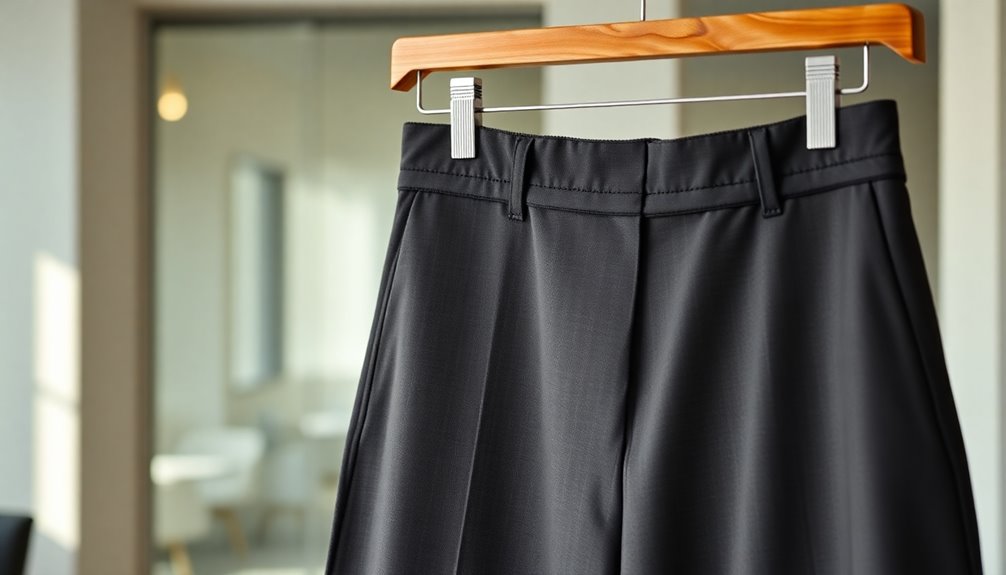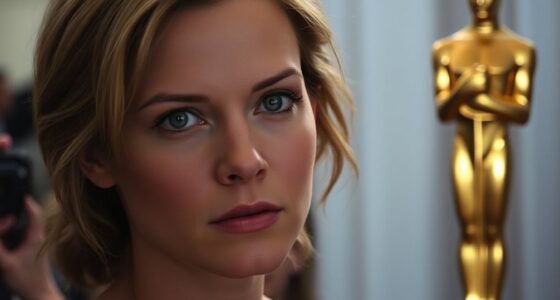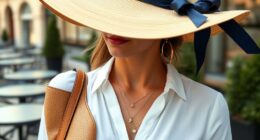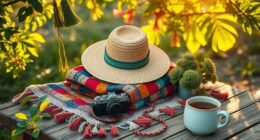Gray sweatpants aren't just comfy; they symbolize a shift in fashion and femininity. You've likely noticed how they blend style and relaxation, making them perfect for various looks. This trend mirrors evolving gender perceptions, with women embracing casual attire that reflects confidence and approachability. Social media amplifies their appeal, showcasing influencers rocking them effortlessly. Plus, the versatility means you can dress them up or down, making them wardrobe staples. If you find this trend intriguing, there's plenty more to discover about how gray sweatpants are reshaping our views on comfort and fashion.
Key Takeaways
- Gray sweatpants symbolize a blend of comfort and style, appealing to women who seek laid-back yet fashionable outfits.
- They challenge traditional gender norms, allowing women to adopt masculine styles while promoting an approachable demeanor.
- Women notice the versatility of gray sweatpants, easily pairing them with various tops and accessories for different occasions.
- The trend reflects evolving societal views on body image, encouraging acceptance of diverse shapes and casual attire without stigma.
- Sustainability in fashion is emphasized, as many brands focus on eco-friendly materials for gray sweatpants, aligning with women's growing environmental consciousness.
Cultural Significance of Gray Sweatpants
The cultural significance of gray sweatpants has skyrocketed in recent years, especially within social media circles. You might have noticed how they've become synonymous with "Gray Sweatpants Season," a trend that highlights how these pants accentuate the male physique. Platforms like Twitter, Instagram, and TikTok are flooded with memes and jokes, adding a humorous spin to this fashion statement. Influencers and celebrities frequently don gray sweatpants, reinforcing their image as stylish yet comfortable.
In the realm of fashion media, they've been celebrated in various articles and style guides, showcasing how to incorporate them into modern outfits. This shift towards casual, athleisure wear reflects a broader cultural movement where comfort meets style. Gray sweatpants symbolize a laid-back, effortlessly chic look, often associated with home environments and leisure activities. They highlight the contours of the male body, making them subjects of playful attention. This popularity is due in part to their versatility in styling, allowing them to be paired seamlessly with various outfits.
As you engage with this trend, you’ll see how gray sweatpants embody a balance between relaxation and fashion, appealing to both fashion enthusiasts and those who prefer casual wear. Their impact is undeniable, making them a staple in contemporary male wardrobes. Their versatility allows them to be dressed up with tailored jackets or kept casual with a simple tee. This adaptability is what makes them a must-have for anyone looking to elevate their everyday look. Moreover, many brands are now embracing this trend, showcasing a stylish men’s sweatpants collection that combines comfort with cutting-edge design, ensuring that every man can find the perfect pair to suit his personal style.
Versatility in Fashion Choices
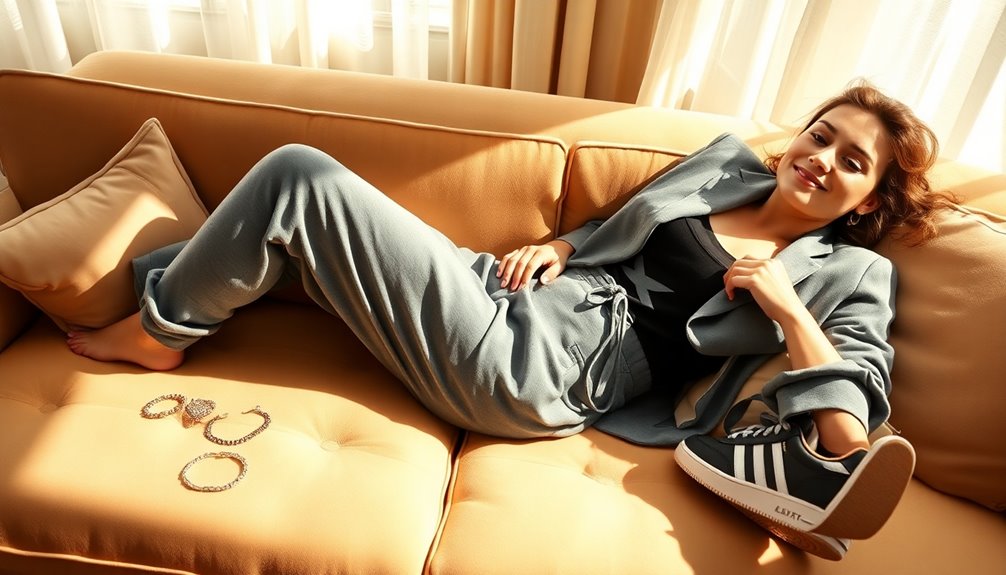
Gray sweatpants aren't just a cultural phenomenon; they also shine in versatility when it comes to fashion choices. You can easily pair them with a range of tops, from simple t-shirts and hoodies to dress shirts for a polished look. For a sporty vibe, throw on an athletic jacket or zip-up hoodie. If you're aiming for something more sophisticated, combine gray sweatpants with a crisp button-up shirt and a blazer. Layering is where the magic happens; oversized sweaters or denim jackets can add style and warmth.
These sweatpants work for various occasions, whether you're lounging at home, running errands, or heading out for a casual dinner. You can elevate your outfit for informal work settings or social events with just a blazer or overcoat. For light workouts, they're the perfect choice too. Assessing the wardrobe regularly can help you identify which tops and accessories will best complement your gray sweatpants.
You can also mix and match accessories. A vibrant red handbag, for instance, can add a pop of sophistication. No matter your body type or personal style, gray sweatpants offer endless possibilities to express yourself while keeping it stylish and comfortable.
Comfort and Material Benefits
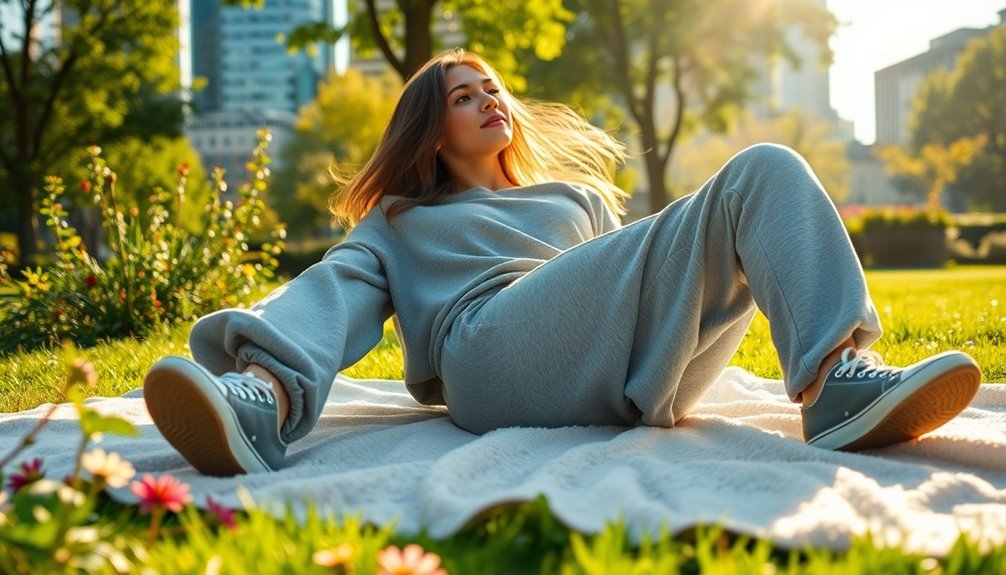
Comfort defines gray sweatpants, making them a go-to choice for relaxation and leisure. You'll appreciate how they symbolize ease, often becoming your favorite attire for lounging at home or running errands. Their baggy design, fitted at the waist and roomy elsewhere, allows for free movement, prioritizing a laid-back look that's effortlessly stylish.
The materials used in gray sweatpants greatly enhance your comfort. Typically crafted from soft cotton, cozy fleece, or flexible synthetic blends, these fabrics ensure that you feel great all day. Cotton's breathability and durability make it a popular choice, while fleece and terry cloth provide warmth during colder months. For added flexibility, synthetic blends like polyester and elastane improve strength and wrinkle-resistance, keeping you looking good without extra effort. Additionally, many options feature sweat-wicking fabric for versatility, making them suitable for various activities.
What's more, moisture-wicking fabrics blended with spandex or modal keep you dry and comfortable, even during active moments. Their breathable nature prevents overheating, making them suitable for both relaxed days and layered outfits. Overall, gray sweatpants combine comfort and material benefits, ensuring that you always feel relaxed while looking effortlessly chic.
Trends and Popularity Insights
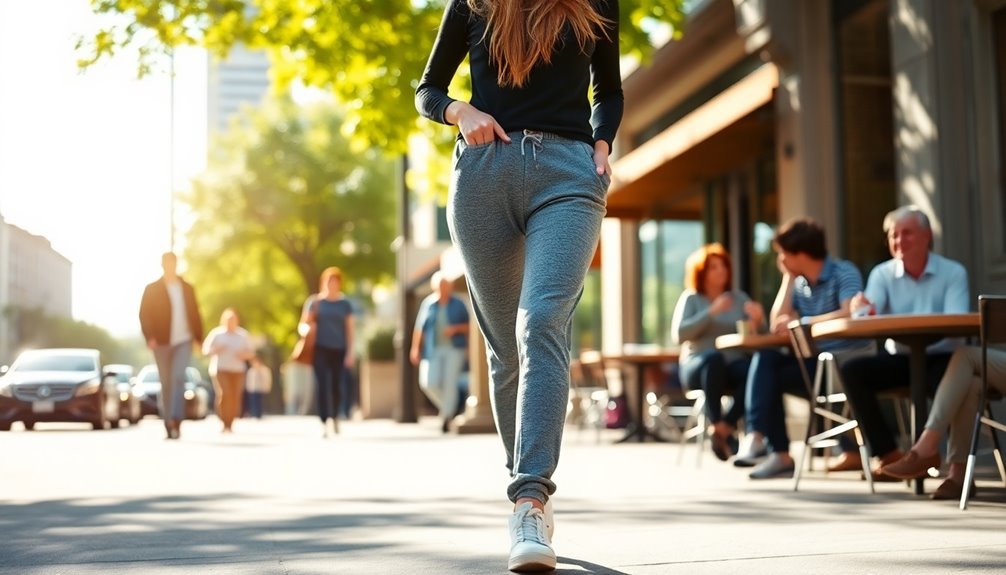
Over the years, gray sweatpants have really taken off, evolving from simple lounge wear into a major fashion statement. You'll notice their versatility, as they pair effortlessly with different tops and shoes, making them a staple in casual wardrobes. Whether you're heading out for a casual outing, doing light workouts, or attending a smart-casual event, gray sweatpants can adapt to your needs. You can style them with athletic jackets, hoodies, or even blazers to create diverse looks. The addition of creative shoe choices can truly transform the overall aesthetic of your gray sweatpants outfits.
Their rise in popularity isn't just about comfort; gray sweatpants have become a cultural phenomenon on social media. Platforms like Instagram and TikTok showcase influencers and celebrities wearing them, reinforcing their status as a stylish yet comfortable choice. The term "gray sweatpants season" even went viral, sparking memes that humorously highlight their fit and ability to accentuate body shape. Additionally, the trend reflects a broader shift towards inclusive fashion that embraces comfort and style for all body types.
With countless fashion articles spotlighting them, it's clear that gray sweatpants have influenced trends in athleisure and streetwear. So, if you haven't already embraced this trend, it's time to consider how gray sweatpants can elevate your style game.
Gender Perceptions and Evolution
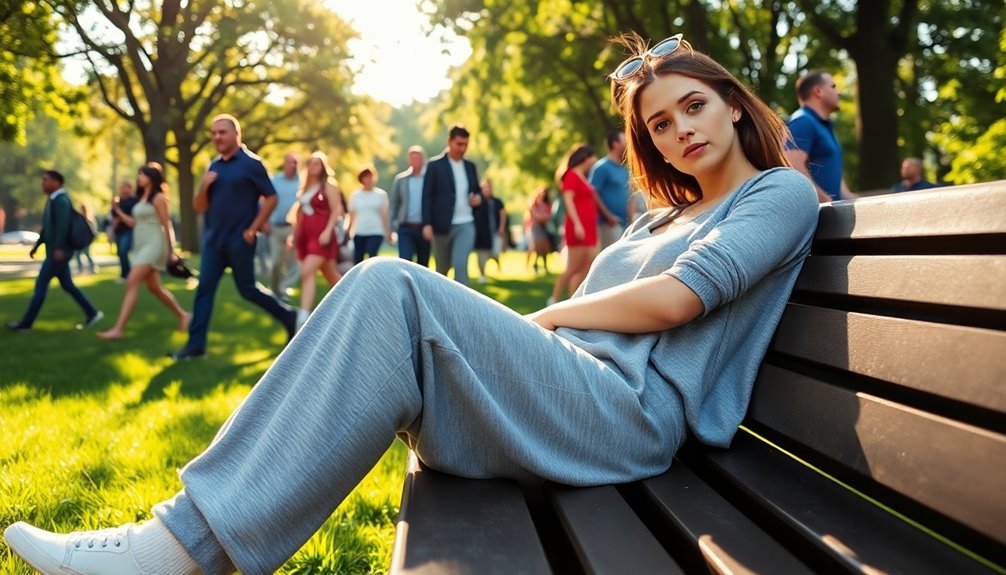
As gray sweatpants gain traction in fashion, their influence extends beyond mere style, touching on deeper societal themes related to gender perceptions. Historically, gender roles evolved based on societal needs rather than innate traits. In early eras, men and women shared responsibilities, but as societies settled, roles shifted significantly, often assigning men to labor and women to domestic tasks. Despite this, the emergence of trends like gray sweatpants signals a shift in how we view these roles.
Over time, gender stereotypes have transformed. While it's increasingly accepted for women to adopt masculine traits, men still face scrutiny for embracing femininity. This cultural asymmetry is evident in clothing choices; women wearing pants is now commonplace, yet men in dresses often draw attention. Social media and casual fashion trends contribute to this evolution, challenging traditional norms. Gender roles have historically limited the expression of individuals, but trends like gray sweatpants help to push these boundaries further. Recognizing patterns of behavior in fashion choices can reveal underlying cultural shifts and attitudes toward gender. Additionally, the rise of female esports organizations illustrates how women are increasingly breaking barriers in traditionally male-dominated fields.
Moreover, as women outpace men in education and professional realms, the quest for gender equality continues. It's clear that gray sweatpants aren't just a fashion statement—they reflect an ongoing journey toward redefining gender perceptions and breaking down outdated stereotypes. So next time you see someone in gray sweatpants, think about the broader implications of that choice.
Frequently Asked Questions
How Do Gray Sweatpants Fit Into Sustainable Fashion Practices?
Gray sweatpants fit seamlessly into sustainable fashion practices by utilizing eco-friendly materials like organic cotton and recycled fibers. When you choose sweatpants made with non-toxic dyes and minimal waste processes, you're supporting a healthier planet. These options often come with fair labor practices, ensuring workers are treated ethically. Plus, their long-lasting quality means you won't need to replace them frequently, further reducing your environmental impact while staying stylish and comfortable.
What Are the Best Brands for High-Quality Gray Sweatpants?
If you're looking for high-quality gray sweatpants, brands like Carhartt WIP and Kenzo offer stylish options that blend comfort and design. For luxury, check out Wooyoungmi or Stone Island, which emphasize innovative fabrics. Nike and adidas provide versatile choices perfect for both casual and active wear. Don't overlook Champion for classic styles. For something unique, consider Palm Angels for that effortless California vibe. You'll find something that suits your personal style!
Can Gray Sweatpants Be Dressed up for Formal Occasions?
Absolutely, you can dress gray sweatpants up for formal occasions! Pair them with a crisp button-up shirt and a tailored blazer for a smart-casual vibe. Add loafers for a polished touch, or smart sneakers for a more relaxed look. Layering with an oversized sweater or a chic coat can elevate your outfit further. With the right accessories, you'll create a stylish ensemble that effortlessly blends comfort and sophistication.
What Body Types Look Best in Gray Sweatpants?
Gray sweatpants look great on various body types, so you can find a style that suits you best. If you've got an athletic build, slim-fit styles accentuate your muscle definition, while those with a slim build can opt for either slim or baggy fits for comfort. Average body types benefit from the versatility of gray sweatpants, and curvy builds shine in high-waisted or oversized options that highlight your shape beautifully.
How Do You Style Gray Sweatpants for Different Seasons?
To style gray sweatpants for different seasons, you can mix and match various tops and accessories. In spring and summer, pair them with a light T-shirt and sneakers. For fall and winter, layer with a cozy sweater or jacket, and add warm accessories like beanies. Always consider your shoes; sleek sneakers or loafers can elevate your look. Remember, rolling the cuffs can enhance the overall style throughout the year!
Conclusion
In conclusion, gray sweatpants aren't just a casual wardrobe staple—they carry cultural significance and versatility that many women appreciate. Their comfort and material benefits make them a go-to choice for both lounging and outings. As trends evolve, the perception of gray sweatpants continues to shift, reflecting changing gender norms and styles. So next time you see someone in them, remember they symbolize more than just comfort; they embody a blend of style, confidence, and cultural insight.
